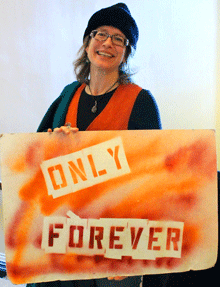 WILLING TO GO THE DISTANCE Building a cooperative
economy will take time and patience |
In my decades as a journalist, I’ve heard Bob Dylan’s “Blowin’ in the Wind” countless times at activist gatherings. In the 50-plus years since the song was released, it’s become an anthem for people working for social change.
But when I heard it at the January 9 progressives’ rally at the State House, sung by a young woman to launch the event, I wondered what even a partial answer might be to the question it asks: How many times, years, deaths will it take until a far more decent society is created?
I bet I wasn’t the only person with that thought in this now-annual, beginning-of-the-legislative-session get-together in Augusta sponsored by a coalition of grassroots groups called the Alliance for the Common Good.
A hundred idealistic people, young and old, loudly demanded health care for all, the reduction of student debt, the revocation of “corporate personhood,” the end of futile foreign wars, and the preservation of the environment (no East-West Highway, no mining at Bald Mountain, no tar-sands oil in Maine).
The targets were clear: global corporate capitalism, which brings about the endless exploitation of the earth and her people, and governments that do the corporations’ bidding.
Along one wall, the Union of Maine Visual Artists’ activist “Rapid Response Team” stood in homemade hazmat suits and face masks ready to “clean up the political mess,” one team member told me. That certainly won’t be easy. With state government as my beat, I know how deeply corporate lobbyists and their money have soiled the marble and granite of the Capitol.
What, then, will it take, as Dylan asks?
This fall I spent a month working with Al Jazeera America TV-network reporter Casey Kauffman, producing stories on a variety of Maine issues. Casey came here from years of covering wars and revolutions in Africa and the Middle East.
One day as we drove around the state, I asked him what it takes, based on his experience, for people to rise up and transform an oppressive economic and political system. His answer, roughly: they have to be literally dying in the streets.
We’re not at that point — yet — despite America’s enormous economic inequality, great poverty, shrinking economic mobility, sick health-care system, and other symptoms of a disintegrating society.
On the positive side, activists have brought about big changes in civil rights and environmental protection over the last half century. But economic globalization, global warming, and global wars (they’re interrelated) threaten to overshadow those gains and make our current problems seem mild.
The next revolution?
Even after a financial crisis caused by the greed of the One Percent, income inequality continues to grow, the culpable banks are bigger than ever, the rich continue to invest in (or, in plainer terms, exploit) cheaper, less-protected workers overseas, and life is getting tougher for everybody else.
That conclusion was vividly presented in a film, The Next American Revolution, shown at the Belfast Free Library on the evening of the rally.
The film features economist Gar Alperovitz lecturing, using abundant visuals, on how broadly a poisonous economic stagnation and decay have spread across the United States — and how liberal reform has been a weak antidote. Alperovitz, who teaches at the University of Maryland, is one of the country’s leading left-wing economists.